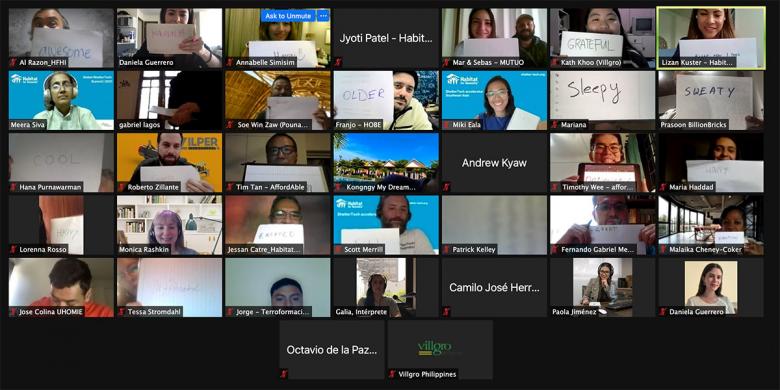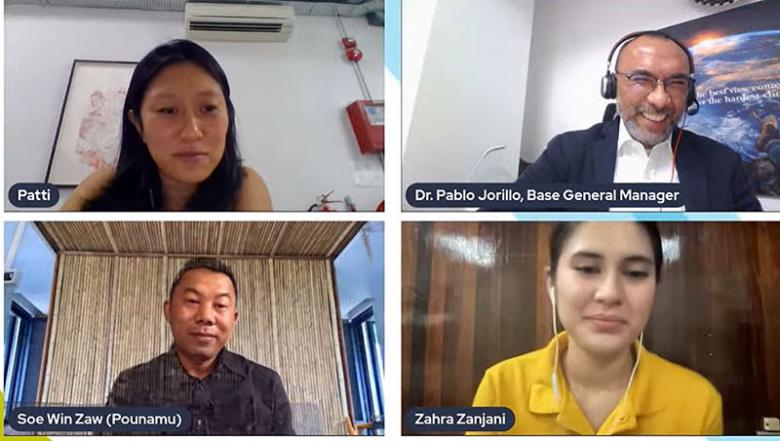Habitat’s regional ShelterTech accelerator concludes with bold vision for affordable housing sector

Ten Southeast Asian startups pitched their housing solutions following seven months of support and mentorship by leaders in the technology and impact investment sectors
MANILA (July 14, 2021) — A Global Summit celebrated the conclusion of Habitat for Humanity’s ShelterTech accelerator in Southeast Asia, where the 10 startups presented their work and progress to date, followed by reflection by investors and ecosystem partners on why innovation in affordable housing market is critical.
First launched in 2017 with accelerator programs in Mexico, India and Kenya, ShelterTech has grown into a global platform to connect innovating ideas, products and services in affordable housing, with special focus on solutions that work in the context of the COVID-19 pandemic. ShelterTech aims to make housing a top impact investment category.
“ShelterTech works across sectors, industries and geographies to bring together the most impactful and cutting-edge innovations improving housing conditions for low-income families across the globe. We chose the 10 startups in the Southeast Asia cohort because we believe they will make significant contributions to addressing the global housing deficit,” said Jonathan Reckford, CEO of Habitat for Humanity, at the opening of the Summit. Launched in Southeast Asia in July 2020, the accelerator attracted more than 100 ventures, vying for a chance to be part of the world’s leading platform for affordable housing innovation.
Reckford’s message was echoed by Marco Meyrat, chairman of the Hilti Foundation’s board of directors, “ShelterTech puts housing entrepreneurs at the center of a highly connected ecosystem of collaborators who share a passion for revolutionary solutions in affordable housing. This is well aligned with the Hilti Foundation’s commitment helping identify and catalyze innovative technologies for housing that lay the groundwork for a better future.”
Startups from Cambodia, Indonesia, Malaysia, Myanmar, Philippines and Singapore were selected for the program in late-2020. In addition to an initial catalytic grant of US$10,000, the ventures completed a seven-month acceleration process, which included learning laboratories, masterclasses on housing and business topics, dialogues with regional investors and one-on-one mentorship with seasoned experts from global corporations including Hilti, Dow and Autodesk.

(Clockwise from top left) Patti Chu, Mana Impact Partners, moderated a plenary on housing and climate change with panelists Dr. Pablo Jorillo from BASE Bahay Foundation, Zahra Zanjani from CUBO Modular and Soe Win Zaw from Pounamu.
During the pitches, startups recounted their growth journey since joining ShelterTech and their plans to bring affordable housing products and services to millions of low-income families in the region. CUBO Modular, which is based in the Philippines and manufactures modular homes out of bamboo, has sold out all units of their award-winning homes for the remainder of the year. Sampangan’s proprietary “magic box” turns waste into activated carbon, which is used to create building materials. The Indonesian startup recently secured new contracts with governments and the largest startup in Indonesia to create more long-lasting products out of waste materials.
Following the Global Summit, ShelterTech will continue to provide recognition and growth opportunities to startups, while developing its close-knit ecosystem of ventures and partners. The platform will also partner with other national and regional accelerators, in fields such as PropTech and smart cities, to integrate an affordable housing track into their programs.
A corresponding accelerator and Summit also took place in the Andean region of South America. In total, ShelterTech has supported over 60 startups and scaleups worldwide to date. In Southeast Asia, the accelerator was run in partnership with Villgro Philippines and Global Urban Village.